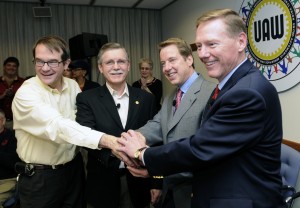
Happier days for all back in 2007.
Members of the United Auto Workers have ratified a new agreement with the Ford Motor Co, the union said Monday. The new agreement substantially modifies the union’s 2007 labor agreement with Ford. It also changes the financing for the independent Voluntary Employee Beneficiary Association (VEBA) trust for retiree health care.
The Ford deal is also expected to serve as the model for the union’s new agreements with General Motors and Chrysler LLC. The union is attempting to use the agreement with Ford to protect itself from demands for even more concessions from the other two automakers.
Whether this is acceptable to the U.S. Treasury Department remains to be seen. Members its Auto Task Force are in Michigan today to talk with UAW, Chrysler and General Motors executives. A GM statement about the talks was non-committal: “We believe today’s visit provided a constructive glimpse of GM people, their passion for their work, and the future products and technologies that are an integral part of our viability plan.” Chrysler had no immediate comment.
Fifty-nine percent of Ford production workers and 58 percent of skilled-trades workers voted for the agreement, in balloting that took place at UAW Ford locations throughout the United States. More than 40 percent of the Ford Workers voted against the agreement.
Votes from the big Ford manufacturing complex in Dearborn, Michigan — the Rouge — apparently decided the issues; workers approved the agreement 55 percent to 45 percent, observers said.
“Once again UAW members have stepped up to make the difficult decisions necessary to deal with the reality of the current economy, the deteriorating auto industry as a whole and specifically the negative impact the economic climate is having on Ford Motor Co.,” said UAW President Ron Gettelfinger.
Click here for the Auto Task Force story.
“We are focused on doing everything possible to rebuild a great industry and keep manufacturing jobs in the United States,” said Gettelfinger. “As we have stated many times, in order to succeed, shared sacrifice will be required from all stakeholders, including executives, directors, shareholders, bondholders, dealers and suppliers.”
“By working together with our UAW partners, we identified solutions that will help Ford reach competitive parity with foreign-owned auto manufacturers and that are important to our efforts to operate through the current economic environment without accessing a bridge loan from the U.S. government,” said Joe Hinrichs, group vice president, Global Manufacturing and Labor Affairs, Ford Motor Company.
“We are facing an unprecedented loss of sales and revenue at Ford,” said UAW Vice President Bob King, who directs the union’s Ford Department. “Our bargaining committee made an extraordinary effort to negotiate changes in a responsible way that will help Ford be competitive, while still protecting our active and retired members.
“The voting results show that our members are prepared to make painful sacrifices in order to be part of the solution to the problems facing Ford and the U.S. auto industry,” King said.
Opponents of the contract in the union’s ranks argued there was no guarantee that the union’s concession, which will save Ford close to $2 billion will actually help turn around the company’s fortunes.
While Ford has not asked for government aid, it has used the Great Recession to seek concessions from the union. Ford has also asked for government help for its suppliers, and is currently pressing the Swedish government for assistance with its Volvo subsidiary. The Belgium government has already agreed to substantially subsidize wages for Volvo workers at a plant there.
The deal could save Ford $1.6 billion in cash next year. Under terms of the 2007 contract, Ford was expected to transfer $3.2 billion to the VEBA in 2010. It now has the option to use stock for half of that amount instead of cash.
The contract concessions will also eliminate two paid holidays, eliminate two, one-time productivity bonuses due next year, end the quarterly cost-of-living wage adjustments and put new limits on supplemental unemployment benefits that workers have been paid for a half-century.
Ken Zino added reporting and edited this story.
